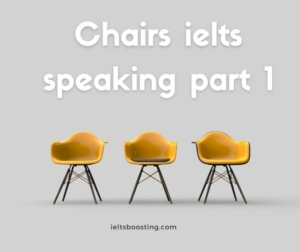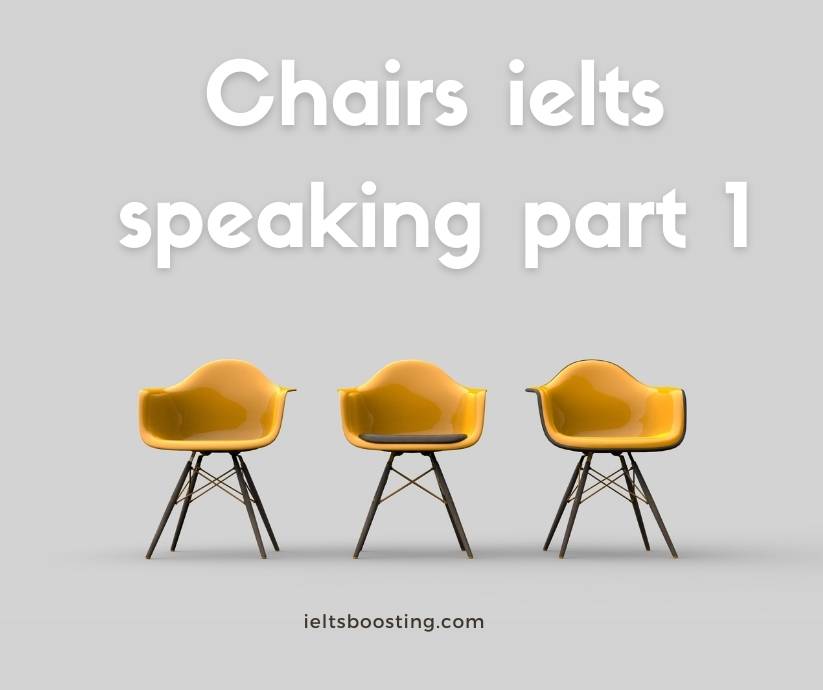Chairs ielts speaking part 1
What kinds of chairs do you have in your room?
In my room, I’ve got a couple of different kinds of chairs, actually. The first is a classic office chair – quite ergonomic, with good back support, perfect for when I’m working at my desk. Then, there’s this cozy armchair in the corner, ideal for reading or just relaxing. It’s quite plush and comfortable, a real treat to sink into after a long day. Both serve their purposes well and add a bit of character to the room.
Useful Vocabulary:
- Ergonomic: Designed for efficiency and comfort in the working environment.
- Back support: A feature in chairs that provides support to the user’s back.
- Desk: A piece of furniture with a flat surface, used for writing, working, etc.
- Cozy: Giving a feeling of comfort, warmth, and relaxation.
- Armchair: A comfortable chair with side supports for a person’s arms.
- Plush: Richly luxurious and comfortable.
- Character: The mental and moral qualities distinctive to an individual or thing.
- Relaxing: Reducing tension or anxiety.
Do you prefer sitting on a wooden chair or a sofa?
Personally, I prefer sitting on a sofa. There’s something about the softness and comfort of a sofa that a wooden chair just can’t match. A sofa feels more inviting, perfect for lounging or having a relaxed chat. It’s also great for accommodating more than one person, which is ideal for socializing. While I appreciate the sturdiness and classic look of a wooden chair, for sheer comfort and versatility, the sofa wins for me.
Useful Vocabulary:
- Softness: The quality of being easy to mold, cut, compress, or fold; not hard or firm to the touch.
- Comfort: A state of physical ease and freedom from pain or constraint.
- Inviting: Appealing, enticing, or attractive.
- Lounging: Lie, sit, or stand in a relaxed or lazy way.
- Relaxed chat: An informal conversation in a comfortable setting.
- Accommodating: Fitting in with someone’s wishes or demands in a helpful way.
- Socializing: Participating in social activities; mixing socially with others.
- Sturdiness: The quality of being strongly and solidly built.
- Versatility: Ability to adapt or be adapted to many different functions or activities.
Explore more: forecast speaking quy 1 2024

Chairs ielts speaking part 1
Would you choose a chair that is sturdy or comfortable?
Do you think a good chair will improve your health?
Absolutely, I do believe that a good chair can significantly improve your health. If you think about it, many of us spend a considerable amount of time sitting, whether it’s for work or leisure. A well-designed chair that supports proper posture can help prevent back pain, neck strain, and other posture-related issues. It’s not just about comfort; it’s also about maintaining good spinal alignment and reducing the risk of long-term health problems. So, investing in a good chair is not just a matter of comfort, but also a matter of health and well-being.
Useful Vocabulary:
- Well-designed: Created in a way that is both functional and appealing.
- Proper posture: The correct position of the body for good health.
- Back pain: Discomfort or aches in the area of the back.
- Neck strain: Discomfort or tension in the neck area.
- Posture-related issues: Health problems caused by incorrect body position.
- Spinal alignment: The proper positioning of the spine.
- Health problems: Medical conditions or issues.
- Well-being: The state of being comfortable, healthy, or happy.
- Investing: Devoting resources with the expectation of a beneficial result.

